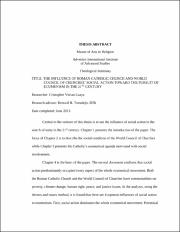The Influence of Roman Catholic Church and World Council of Churches' social action toward the pursuit of Ecumenism in the 21st century
Abstract
Central to the venture of this thesis is to see the influence of social action to the search of unity in the 21st century. Chapter 1 presents the introduction of the paper. The focus of Chapter 2 is to describe the social condition of the World Council of Churches while Chapter 3 presents the Catholic’s ecumenical agenda motivated with social involvement.
Chapter 4 is the heart of the paper. The second document confirms that social action predominantly occupied every aspect of the whole ecumenical movement. Both the Roman Catholic Church and the World Council of Churches have commonalities on poverty, climate change, human right, peace, and justice issues. In the analysis, using the themes and issues method, it is found that there are 4 topmost influences of social action to ecumenism. First, social action dominates the whole ecumenical movement. Polemical
issues are waived and the ecumenical movement today focuses on more agreeable social concerns. Second, the dominance of social action leads to doctrinal tolerance and compromise. The over-emphasis to serving together (diakonia) will inevitably lead the movement into a one-sided ecumenism. Third, social action adds to the optimism that someday Christians will celebrate the same eucharist together. The theological accent of the eucharist is forgotten and ecumenists are shifting into its social expression. And fourth, due to the rampant tolerance and compromise, the Roman Catholic Church advances its distinctive and matchless eschatological mission. The Roman Catholic Church’s unmatched advocacy to social issues may serve as a good example and encouragement for Protestants. The Protestants’ de-emphasis of doctrines may contribute to Catholic control.
Chapter 5 deals with the summary and conclusion of the work. When social action is the basic and common denominator of every ecumenical endeavor—where doctrines are only secondary matters—there will be no fruitful results. The usual consequence is today’s ecumenical movement, whose enduring advocacy is the incessant calling for ecumenical unity.


